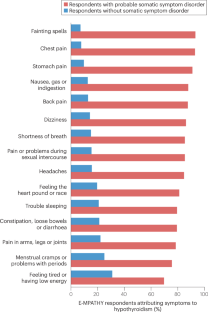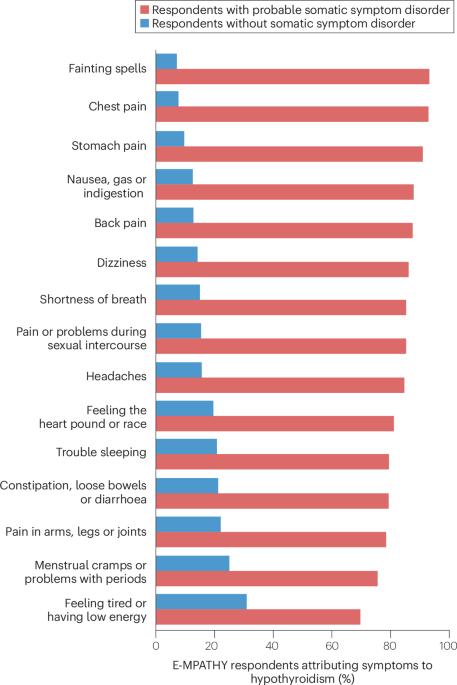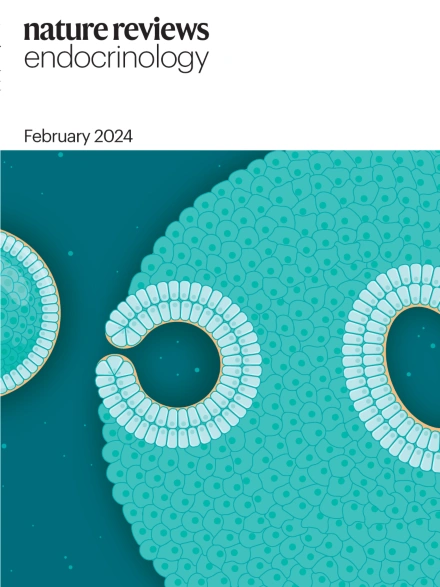医学上无法解释的甲状腺功能减退症症状
IF 31
1区 医学
Q1 ENDOCRINOLOGY & METABOLISM
引用次数: 0
摘要
持续性症状在普通人群中很常见,在甲状腺功能减退症患者中更是如此。当症状无法解释并引起医学注意时,这些症状可被称为医学上未解释的症状(MNYES),患者、护理人员和专家都喜欢用这个词来代替其他描述。MNYES可能会被内分泌专家忽视,或被误认为是甲状腺功能减退症。与昂贵的过度检查和过度治疗甲状腺激素(如左甲状腺素和甲状腺氨酸)相比,认识到 MNYES 可为因不明症状而向内分泌科医生求诊的患者提供更有效、危害更小的干预措施。内分泌科医生的职责是认识到并承认MNYES可能是患者症状的根源,与患者和其他参与患者治疗的人员进行有效沟通,采用 "双轨方法 "进行管理,同等重视身体和社会心理因素,并与其他相关医疗专业人员合作。将患者的症状恶化风险分为不同等级,有助于选择合适的疗法。有效管理 MNYES 需要时间、培训、专业知识和资源。本文章由计算机程序翻译,如有差异,请以英文原文为准。


Medically not yet explained symptoms in hypothyroidism
Persistent symptoms are common in the general population and even more so in people with hypothyroidism. When symptoms are unexplained and brought to medical attention, they can be referred to as medically not yet explained symptoms (MNYES), a term preferred to other descriptors by patients, care-givers and experts. MNYES might be neglected by endocrinologists or misattributed to hypothyroidism. Awareness of MNYES could open up more effective and less harmful interventions for patients who present to endocrinologists with unexplained symptoms than costly over-investigations and over-treatment with thyroid hormones (such as levothyroxine and liothyronine). The role of the endocrinologist is to recognize and acknowledge that MNYES could be underlying a patient’s presentation, to communicate effectively with the patient and others involved in the patient’s care, to apply a ‘two-track approach’ in management by paying equal attention to physical and psychosocial contributors, and to collaborate with other relevant health professionals. Categorization of patients into levels of risk for symptom deterioration helps in selecting suitable therapies. Effective management of MNYES demands time, training, expertise and resources. Medically not yet explained symptoms (MNYES) are an important consideration in patients treated for hypothyroidism who experience persistent symptoms. This Perspective brings attention to the issue of MNYES in hypothyroidism and considers effective management.
求助全文
通过发布文献求助,成功后即可免费获取论文全文。
去求助
来源期刊

Nature Reviews Endocrinology
医学-内分泌学与代谢
CiteScore
42.00
自引率
0.70%
发文量
158
审稿时长
6-12 weeks
期刊介绍:
Nature Reviews Endocrinology aspires to be the foremost platform for reviews and commentaries catering to the scientific communities it serves. The journal aims to publish articles characterized by authority, accessibility, and clarity, enhanced with easily understandable figures, tables, and other visual aids. The goal is to offer an unparalleled service to authors, referees, and readers, striving to maximize the usefulness and impact of each article. Nature Reviews Endocrinology publishes Research Highlights, Comments, News & Views, Reviews, Consensus Statements, and Perspectives relevant to researchers and clinicians in the fields of endocrinology and metabolism. Its broad scope ensures that the work it publishes reaches the widest possible audience.
 求助内容:
求助内容: 应助结果提醒方式:
应助结果提醒方式:


